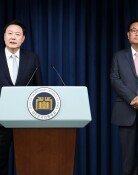Seoul-Tokyo tensions should be addressed as GSOMIA expires soon
Seoul-Tokyo tensions should be addressed as GSOMIA expires soon
Posted November. 04, 2019 07:29,
Updated November. 04, 2019 07:29
South Korean President Moon Jae-in arrived in Thailand on Sunday on a 3-day journey to attend the ASEAN+3 summit will be present. Meanwhile, the South Korean president and Japanese Prime Minister Shinzo Abe are not scheduled to meet even though the General Security of Military Information Agreement (GSOMIA) will come to an end in less than three weeks. This is the last chance before the two leaders can meet in person before the expiry of the GSOMIA as the Asia-Pacific Economic Cooperation summit in Chile has been canceled, however it seems likely that there won’t be an opportunity to turn around the tense relations between South Korea and Japan.
The neighboring countries have not closed the gap in their views as the GSOMIA is scheduled to expire on November 22. President Moon made a conciliatory gesture with South Korean Prime Minister Lee Nak-yeon’s attendance to the enthronement of the new Japanese emperor, however Tokyo has been insisting that there would be no progress in the bilateral relations without the resolution of the forced labor issue. “It seems to be a difficult road ahead,” said Kang Chang-il, the chair of the South Korea-Japan Parliamentarians' Union, after his meeting with Japanese counterparts in Tokyo last week. National Assembly Speaker Moon Hee-sang also canceled his talks with Japanese politicians during his Japan visit to attend the G20 summit on Sunday in line with such hardened relations between the two countries.
While South Korean and Japan have been unsuccessful at finding resolutions and practically neglecting the issue, the U.S. has been increasing the last-minute diplomatic pressure by warning about the negative impact that the expiry of the GSOMIA will bring about. "Nobody is happy with the situation. Actually not nobody -- there are people happy with the situation, but they happen to be in Beijing, Moscow and Pyongyang," Deputy Assistant Secretary of State for Japan and Korea Marc Knapper said during an interview with Japanese media on Saturday. Regarding the joint training of Chinese and Russian military aircraft over Dokdo in July, he said, “The timing and location of that exercise were not a coincidence,” and emphasized the need for security cooperation between South Korea and Japan. Assistant Secretary of State for the Bureau of East Asian and Pacific Affairs David Stilwell is likely to call for the withdrawal of the GSOMIA’s expiry during his visit to South Korea on Tuesday.
The GSOMIA, aside from the controversies surrounding its actual effectiveness and replaceability, is an important linkage in the trilateral security cooperation among South Korea, the U.S., and Japan with significant symbolic meaning and psychological impact. Therefore, the U.S is taking the upcoming expiry of the GSOMIA very seriously. Once the GSOMIA comes to an end, South Korea may be held responsible for its expiry as tensions in the alliance between South Korea and the U.S. are building resulting from the negotiations on the sharing of defense costs, the transfer of wartime operational control, etc. The psychological blow that South Korea-Japan relations will be faced with cannot be ignored either. It will confirm that the one last sliver of possibility to restore the bilateral relations is lost while the situation has gotten as bad as it could. It is regretful that Japan is not showing any gesture of conciliation despite efforts made on the South Korean side, including a handwritten letter by President Moon. South Korea should consistently urge Japan’s change of attitude while looking for ways to begin conversations, rather than simply waiting around for Japan’s response.
Headline News
- Med professors announce intention to leave hospitals starting Thursday
- Bridge honoring Sgt. Moon Jae-sik unveiled in Pennsylvania
- Chief of Staff Chung tells presidential secretaries to stay away from politics
- US FTC bans noncompete agreements
- N. Korea launches cyberattacks on S. Korea's defense companies







